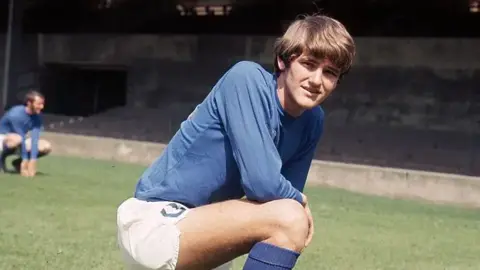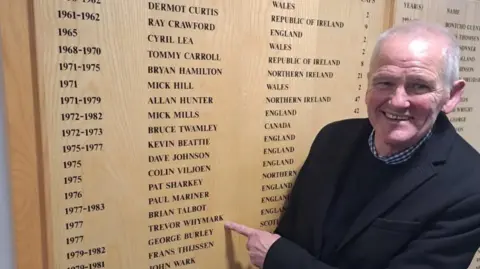Coroner considers football's role in player death
 Getty Images
Getty ImagesAn inquest into the death of a former England footballer has considered whether his career could have been a factor in his death.
Trevor Whymark, who played for Ipswich Town, died aged 74 in October due to bronchial pneumonia, dementia and treated non-Hodgkin's lymphoma, a post- mortem examination concluded.
In a statement read to the inquest in Norwich, his widow Rita said Whymark was renowned during his career for his heading ability.
Senior coroner Jacqueline Lake said questions still remained about whether football had played a part in causing Whymark's dementia.
 Craig Whymark
Craig Whymark"I do not think natural causes accurately reflects the evidence so I propose a short narrative conclusion," she said.
She said Whymark had died from a combination of natural causes and Alzheimer's disease, "the cause of which is not revealed by the evidence."
Whymark, who lived near Harleston, Norfolk, was scouted while playing for Norfolk against Suffolk in a county youth fixture, and made his debut for Ipswich aged 19.
He played for the Blues under Sir Bobby Robson in the 1970s during one of the club's most successful eras, scoring 104 goals in 335 appearances, putting him sixth in Ipswich's all-time list of goalscorers.
He earned a solitary cap for England under Ron Greenwood in 1977, as a second-half substitute against Luxembourg in a World Cup qualifier.
He also turned out for Grimsby Town, Southend United, Colchester United and Peterborough United.
In a statement read on her behalf, Mrs Whymark told the inquest her husband's career as a footballer began in 1969 and he retired in 1985.
"He was renowned for being one of the best for heading the ball in his career," she said.
 Getty Images
Getty ImagesWhymark developed Alzheimer's in 2019, but had been suffering from memory loss since 2015, the inquest heard.
His speech and movement was also affected by the disease and he later required a wheelchair.
A scan in 2019 at the Norfolk and Norwich University Hospital looked at whether his memory loss could be linked to his career, but this proved "inconclusive", the inquest heard.
Whymark was diagnosed with non-Hodgkin's lymphoma in 2022 and the cancer was successfully treated.
However, his condition further deteriorated over the following years and he was referred for palliative care before dying on 31 October at home, surrounded by his family.
Ms Lake said Alzheimer's was often due to natural causes.
But she added: "However, in this case we have heard from Dr Shah that a CT scan is unlikely to resolve the question of whether Mr Whymark's career as a footballer contributed to his condition of Alzheimer's dementia."
Follow Suffolk news on BBC Sounds, Facebook, Instagram and X.
